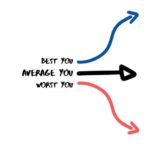Alright, so I know it’s been a long time since my last athlete interview and for that, I apologize. If you wanted more of these athlete stories all you had to do was ask. Thankfully, this interview did not disappoint.
TJ Sanders is a volleyball player and Olympian who plays both professionally overseas as well as for the Canadian National Team. He is a world-class athlete and just an amazing human being. In this wide-ranging interview, TJ talks about everything from the difference between playing overseas vs. the national team, overcoming complacency, daily habits, and, of course, energy. We talked a lot about energy and I’m making no apologies for it.
I was debating cutting this down, but there were too many gems to that I couldn’t throw away. Cycle through the headings that catch your attention and skim over the rest. Treat it like a buffet of insightful ideas and life lessons.
Enjoy!
“Character, like a photograph, develops in darkness.”
— Yousuf Karsh
Table of Contents
Consuming energy to create energy
“There’s something to be said about inputting energy can also output more energy. It’s not like I’m just going to jump around and that’s going to make me tired. I can jump around for a minute and that’s going to give me more energy.”
Derek: TJ recently attended a finance conference in which the speaker, Tony Robbins, would frequently get the audience to stand up and jump around as means of getting them more engaged and focused. It got us onto the topic of how we can create energy.
“If you’re a leader on a volleyball team, you’re going to need energy to lead other people or to influence others. If you are in practice and you’re feeling fresh, moving well, and you’ve got this burst of energy you can feel people being responsive to that. Versus another day where maybe you’d be studying all day and are feeling sluggish or tired, you will also see others react to that. Especially in volleyball where your energy levels can really affect what goes on while you’re on the court.”
“In reference to energy, it’s not necessarily just a physical outburst. I think of moments where I’ve made the biggest strides in my career and they’ve been in my head. And those come from the energy that I’ve put into thinking about how to change things or even just the energy it takes to take risks. If I am going to do something that is out of my comfort zone or risk failure, I have to be more present
How TJ developed his love for volleyball
“When I was in high school I would try to find any YouTube clip of volleyball or anything I could find, and literally just hawk through the internet. And anything I would find I would try it out. I would go out to my front yard and try different things. And really it was the deep desire to figure out how I could perform on a higher level and I think that it took this obsession or passion, which if I didn’t have the energy to put in to learn these new techniques to try them out, figure what’s right and wrong, and all of these little processes you have to go through, it takes a lot of energy.
The purpose of energy
“It’s not just about the energy and effort you’re putting in. But the energy has to allow you to see what’s good and bad, or what’s right and wrong”
Body language and energy
“Your energy levels and your state of mind is something I’ve really been reflecting on. After a loss, you’re slouched over, and you just want to go home and turn the TV on – but after a win, you’re jumping around. So, something is happening there. Something is happening to your body where it’s saying that “I feel good now, so I’ve got more energy to consume.”
The value in finding balance
“When I look back to my early days of developing I wasn’t really worried about my energy levels, but I always had this deep obsession or overbearing passion to be better than everyone else or be the best in whatever that happens to be at the moment. And I think I needed to conserve energy and find energy so I could put it into that thing I was passionate about. But as I’ve gotten older I have started to define that a little more for myself and figure out why I am like this and then harness it. I always used to think that I
The never-ending self-development mindset
“As you improve as a volleyball player you’re always cultivating this self-development mode where getting better at volleyball makes you feel good as a person, which makes you closer to your goals, and that’s moving you closer to your potential as a person. Which is the reality of what we ultimately
Why energy is a infinite resource
“I used to always think of it as if you get 100 volts of energy a day, go use them wisely. Yet, there are all these things that can give you energy. Even just going out and doing a good deed for someone else – you just got more energy from that. I never thought of it that way because I always wanted to conserve energy in anyway I could, not thinking that other things could bring me more energy. And I think that has been so detrimental [in the past] because I haven’t put effort towards things outside of volleyball as much as I wanted to. But now that I don’t have volleyball, I’ve sort of been forced to do so, and that’s allowed me to sit back and find what works for me.”
Derek: What things in your daily routine are draining energy? Can they be replaced with activities that rejuvenate you? How are your little choices building you up or breaking you down? VIDEO
What will change after you get back from your injury?
“One overarching thing is that I want to have a more structured setup. And I think I was getting to that right before the injury, but I’ve just realized that the idea of structure can actually allow for freedom. For example, let’s say tomorrow I have an afternoon practice with the whole morning free. If I have my morning structured the night before when I wake up there’s no panic, there’s no energy wasted through stress. There’s nothing there to leech my energy. So just having that plan for the morning I really am saving my losses by limiting wasted energy and turning that energy into other things.”
“You think of doing those extra things as inputting energy and that’s going to take energy away from you, but it’s the exact opposite. And being able to reflect on how that plays into volleyball development and my lifestyle is really cool. This idea that if I can create structure, then I can have freedom, which eliminates stress and gives more opportunities to do things that can give me more energy.”
Everything comes back to your habits
“All of these little things we do are just habits. You know the ‘good habits’ you want to be doing and if you simply evaluate what you want to be doing in your day-to-day honestly, there are going to be a lot of bad habits in there that you are putting energy into as well, that you can flip into some form a good habit. For example, let’s say when you first wake up and the first thing you do is go on your phone for 15 minutes, maybe if that first thing you do for 15
Where to start to overcome a bad habit?
“First you have to identify the problem. Because if you’re just going on your phone and you’re bored, and you’re not even noticing, it’s kind of hard to actually shift that habit into something you want to do. But after that, the next step is actually perceiving that things could be better. Perceiving that if I put my time into something else, my time could be spent in a better way…and then actually putting that into action.”
Derek: If you are looking for simple ways to put this into action, there a number of strategies you can apply. You can find an accountability partner, make a bet with friend, or use a website like Stickk as a commitment device to get started on something you’ve been putting off.
Avoiding complacency when you know you have a plan B
“When everything is easy, you can kind of have this complacent outlook on life and you can find a lot of people, especially millennials, sort of feeling like they’re stuck. Feeling like things aren’t really going how they thought they would. But if you’re not really pursuing anything, you’re not really getting that gratification from accomplishment. You’re not really overcoming things. And if you look at anything, any shift in your life that you are thankful for, most of them are going to be from something negative. You’re going to look back and there is going to be
“And a way you can produce those [hardships] in your own life, even if you are completely privileged in many ways, is to just set really high goals and have big dreams. Because then you will be disappointed. Then you’re going to strive for them, not accomplish them, have thirst to achieve them, reach them and then move forward.”
Reflecting on my own path, when you are in that kind of complacent state and get stuck, you start to feel a bit of shame for not having an awesome-wonderful life, because everything has been easy for you. You start wondering why am I not enjoying my day-to-day as much as I could be when everything has been given to me. And I’ve had that dose of shame… but just having these goals and aiming for a target that is going to set you down a certain path… I think that’s so crucial in accomplishing anything – even if its just feeling better about yourself and your well-being.”
Derek: This is such a great answer to a perplexing question. How do the vast majority of us who live in the cushy middle class of life find ways to push ourselves if we’ve never really had to face much adversity or setbacks. And setting incredibly ambitious goals is really the best option. Be grateful and take advantage of your blessings. It would be a shame not to. Because you know the athlete who started from the bottom has no intention of stopping once they pass you.
Using regret as rocket fuel
“We were in Edmonton, playing against Cuba, Olympic qualifier, we had beaten Cuba every time in the past couple years, everything is going great in the tournament, we’re feeling great, and we get absolutely slapped. We got beat 3-0 and it felt like a 15-minute game where we just walked in and walked out. We just realized that maybe we’re not as good as we thought. But I remember that blow was what actually led to our team getting a psychologist and basically shined the light on the fact that we are not a very mentally strong team. But because of that loss, that set out the trajectory of where things have gone. At that point, we were around 11th place in the world. But after that we qualified for the Olympics, finishing 5th, 3rd in world league – all of sudden something had clicked. And I swear it was because that group of guys went through a hardship that we never wanted to experience again. It opened the door to having to look at what’s going on inside and how we were all feeling the same thing. It’s just funny how looking back we really weren’t aware of what we were trying to do. That whole mental aspect of the game was being completely neglected.”
“It feels good to overcome things, rather than just achieve something that you’ve been given. All of a sudden, we had to work to get to the Olympics… And I am so happy that we lost that game [to Cuba] because every moment at the Olympics I relished in so much more just because of how difficult it was to get there. If we would have
Derek: If you could take away anything from this entire interview, let it be what TJ just said. One of the greatest failures in his life ended up making him so happy and satisfied in the future. But that was only because as a team they chose to learn from it and grow. If you are you in the aftermath of a failure, don’t let it discourage you. Let it motivate you and push you towards a greater sense of purpose and progress.
The difference between playing overseas Vs. the National Team
“When you’re in an isolated setting versus when you’re with a team, whatever momentum you’re going on is just amplified. If all of a sudden things start going down for you and you’re with a team, everybody starts going down with you. But rarely does that happen because there’s more of you and there is going to be that one person or coach who intervenes. For an individual sport you can go on your own, but you’re limited in how far. If you can get the momentum of all 12 players to go in the same direction, which is what national teams are really good at because you all have this common goal and pride… all of that creates this collective momentum to push everybody in the right direction. When you go overseas, all of a sudden, you’re very isolated. And normally on a team you can reach out to people for help, but with a different culture or personal attitude that is more challenging.”
The value of belonging to a greater cause
“It comes back to this sense of belonging and understanding your role. When I come back to the national team I know that I belong there because I’ve known these guys for most of my life, I know what my role is, and I know how to function and I just know how it all kind of works. But then you go to a pro team and you’re trying to figure out what all that means and if you’re unaware of what matters, you aren’t going to put the right emphasis on that you do want to belong to a group. Especially in a sport like
Who do you turn to when you’re lacking direction?
“You have to have a target that you are aiming at and driving everything towards. I look back on times when I’ve been overseas and in the middle of the season when things aren’t going great. I would often reach out to national team players who are also playing overseas and get talking about the upcoming summer and things we want to accomplish. And just that conversation makes me perform better in training. Because let’s say that we want to do better at the Olympics or medal in world league, so we’re trying to figure out other ways to do that. Just thinking about that adds energy to the practice I’m going into with my pro team. That then becomes the end goal. It’s not about the championship in whatever league I’m in, it becomes ‘I want to be ready to go so that when we come back in the summer we can accomplish bigger goals’.”
“Maybe you don’t have the national team, but you’ve got to find something that’s going to give you energy and motivation. You’ve got to have that target that’s hard to reach. Maybe you’ve been a volleyball player for a long time and your aspirations aren’t that big so you’re just content with playing where you’re playing. But that’s not going to give you that satisfying feeling of failing and achieving or overcoming something and succeeding. If you have those big dreams, like making the Olympics, you’re going to be disappointed at some point along the way and you’re going to have to overcome it. And you know what, maybe that’s not the path that ends up working, but without those things to overcome you’re just going to be stuck in limbo, content with where you are, happy with being just ‘pretty good’. I think your goal really has to be beyond your expectations. Because for me at 16 I seriously would not have thought that my goal would be the Olympics because I didn’t know our national team could make it that far. But as things kept getting closer, the dream kept getting bigger. As I kept progressing the dream kept progressing as well. We all need that carrot right in front of us to keep moving us forward.”
Derek: The overseas professional athlete life is by no means an easy one. I’ve followed my wife around for the past 4 years and even with each
other it hasn’t always been easy. Despite the challenges you will face, you have to embrace the circumstances. Complaining won’t solve anything and throwing yourself a pity-party might feel good for a moment, but it will only make you feel worse in the long run. You’ve got to find meaning and connection wherever you go. Make this a top priority and you’ll be surprised at how much your attitude improves.
What were your goals 10 years ago?
Back then I would have said that I want to be the best in the world. Or I would have said that I want to go to the Olympics. But that’s such an ambitious goal, it doesn’t really mean anything. There’s nothing practical there. However, because I had that [goal] and believed it, that motivated me to try and figure out how to get there. All of a sudden I have this energy that’s going to be put towards the little steps I need to take in order to get there. When I signed to a university, I look at that as being a step. When I left university, I look at that as a big step. Training with the national team full time was a step as well. These goals were always in the back of my mind and its so far out there that I can’t even look at it to achieve it. I had to look at my feet to make these steps and figure out what can I actually do to keep that dream going, which is really hard.”
Reflecting through injury
“When this injury happened I instantly had to evaluate what I want and what my values are. But now that I’ve done that, I’m extremely excited to put everything towards my body so that it can be healthy and how I want it to be. But it’s so easy to get complacent if you’re not reflecting on that goal or striving for that ‘big one’. And maybe you’re not accomplishing it today, but just having that big goal is what you can orient yourself around. We need that target we can aim at. And that target is sort of like your potential. And your aim is having
One piece of advice for every volleyball player
“Dream big. Dream crazy big. Bigger than you can think. Don’t have limitations. If you’re a 15-year-old kid and you see team Canada playing, try and be better than we are right now. Have these grand dreams because all of a sudden that’s going to motivate you to take the little steps to get there. I often look back when people ask me, ‘What do you think has allowed you to develop in the ways you’ve been able to?’, and I always attribute it to an obsession and passion. But then, where does that come from? It’s not like I was born obsessed with volleyball. It has to be connected to the fact that I had this dream and I had this target of being the best in the world, and that was where I was going… And sometimes that dream will feel out of touch and like it isn’t reality. When I was in high school I wasn’t a big kid, I wasn’t athletic, I wasn’t way better than everyone else – I just had to figure out how I was going to reach that dream.”
“And I would also say, have that dream but never be attached to any of the failing along the way. Feel the shame that comes with a loss and then turn it into motivation. Take that into some form of energy and put that back into that big dream you have.”
Big dreams lead to constant failure (and that’s a good thing)
“[Having big dreams] gives you an opportunity to be failing all the time. If I am failing all the time and having to find a way to overcome those failures. Which then gives me
I cannot thank TJ enough for sharing his story and I hope you all took something from this lengthy interview. As I said, you didn’t have to read it all, but even if you just skimmed through, I’m sure there was something useful for you in there.
You can follow TJ’s journey on Instagram @sanders_tj
Thanks for joining along,
-Derek






This is a fantastic article.
I am an assistant coach at one of the universities in Ontario. This article really resonates with what our team is going through.
We have sent this article to our athletes to read. I hope that they will find inspiration and a parallel to what TJ is talking about.
From a personal level, I still play and see so many positives from TJ’s point of view.
This is a great read for every athlete in Canada.
Stay The Course, my friend!!!!
Thanks for sharing the article. Always great when we can find athletes close to home for inspiration. These are common struggles that many athletes have to encounter, but it’s encouraging to know that there is greatness on the other side.
I love this article. I have been involved in the sport of volleyball all my life; as a player; coach; coach mentor and sport administrator. This article aligns with greatness and achievment. I love seeing the sport through the eyes of an accomplished competitor who understands the little habits and the cultural pieces required to be the best in the world.
Couldn’t agree more. TJ is a shining example of an athlete who is living through the extremes highs and lows of being an elite level athlete. It’s not always going to be a perfectly smooth road, but what matters is how well you handle the bumping patches. TJ does a great job of sharing character in these moments.